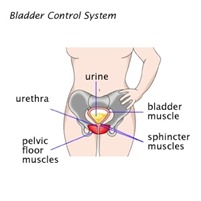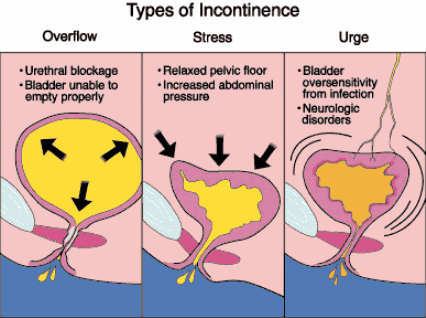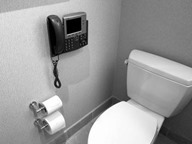 Urine is made as the blood is filtered through the kidneys. The urine then travels through thin tubes called the ureters, to the urinary bladder. The tube known as the urethra travels from the bladder, where it passes through the prostate gland and the penis to allow the release of urine outside of the body. Urinary incontinence refers to involuntary leakage of urine.
Urine is made as the blood is filtered through the kidneys. The urine then travels through thin tubes called the ureters, to the urinary bladder. The tube known as the urethra travels from the bladder, where it passes through the prostate gland and the penis to allow the release of urine outside of the body. Urinary incontinence refers to involuntary leakage of urine.
 The urethra is surrounded by muscular tissue known as the urinary sphincter. The bladder fills with urine, and nerves in the bladder signal the sphincter to remain constricted, as the bladder stays relaxed. When your bladder is full, the nerves in the bladder are triggered to cause the muscles of the bladder to contract, and the urethra relaxes at the same time. Urine then flows from the bladder into the urethra, and you are able to void voluntarily because of the relaxation of the urethral sphincter. Urinary incontinence is the result of a problem somewhere in this pathway. An urologist is a specialist in problems like urinary incontinence, and if you suffer from involuntary leakage of urine, you should consult an expert urologist for an evaluation of your condition. If you are in the New York City area, Dr. Melman is one of the top urologists in the United States, and is available for consultation by appointment.
The urethra is surrounded by muscular tissue known as the urinary sphincter. The bladder fills with urine, and nerves in the bladder signal the sphincter to remain constricted, as the bladder stays relaxed. When your bladder is full, the nerves in the bladder are triggered to cause the muscles of the bladder to contract, and the urethra relaxes at the same time. Urine then flows from the bladder into the urethra, and you are able to void voluntarily because of the relaxation of the urethral sphincter. Urinary incontinence is the result of a problem somewhere in this pathway. An urologist is a specialist in problems like urinary incontinence, and if you suffer from involuntary leakage of urine, you should consult an expert urologist for an evaluation of your condition. If you are in the New York City area, Dr. Melman is one of the top urologists in the United States, and is available for consultation by appointment.

There are different types of urinary incontinence, and they have different symptoms. If you leak urine when you cough, sneeze, laugh, or perform any action that puts pressure or stress on your bladder, this is known as stress incontinence. If you have a strong urge to urinate but can’t make it to the bathroom in time, you may have urge incontinence, which can occur even when your bladder is not full. Stress incontinence may be caused by removal of the prostate gland for prostate cancer or an enlarged prostate gland. Usually behavioral methods, including exercises to strengthen the pelvic floor, are the first attempt at treatment, and surgery may be considered if other methods fail. A bulbourethral sling is currently being studied as a potential treatment that works by supporting the urethra with the sling which is then attached to muscle or to the public bone, elevating the urethra and strengthening urethral resistance to abdominal pressure.
Another type of urinary incontinence is overflow incontinence. This occurs because your bladder doesn’t empty correctly and leaks as a result, after urination. Sometimes your bladder muscles may be weak, and this may be the reason that your bladder doesn’t empty correctly. Your urethra may be blocked by scar tissue or an enlarged prostate gland, which will also prevent you from emptying your bladder. If your overflow incontinence is the result of an enlarged prostate gland, an urologist will be able to treat this condition surgically.
If your sphincter muscle no longer works, you may be leaking urine continuously, which is known as total incontinence. A urologist may be able to surgically correct this condition by implanting an artificial sphincter, made of silicone rubber that fits around the urethra, and which can be inflated or deflated with a pump to control urination.
Incontinence may be short-term, and related to urinary tract infections, prostatitis, or even constipation. Your urologist can help you make the correct diagnosis and when incontinence is due to one of these causes, it usually resolves after treatment.
Pharmacologic treatment of urinary incontinence is always attempted before surgery, if a treatable condition is identified. There are medications that increase the bladder capacity by relaxing the muscles of the bladder wall, and other medications, including duloxetine, an antidepressant, changes how the brain interacts with the bladder, although the mechanism is not entirely understood. Another antidepressant medication, Imipramine, causes the bladder muscle to relax and at the same time causes the muscles at the bladder neck to contract, preventing urge incontinence.
 If you suffer from urinary incontinence, you should consult Dr. Melman in New York City, and take advantage of his years of experience and knowledge, which have made him one of the top urologists in the United States. Contact Dr. Melman today to start your treatment for male urinary incontinence.
If you suffer from urinary incontinence, you should consult Dr. Melman in New York City, and take advantage of his years of experience and knowledge, which have made him one of the top urologists in the United States. Contact Dr. Melman today to start your treatment for male urinary incontinence.
